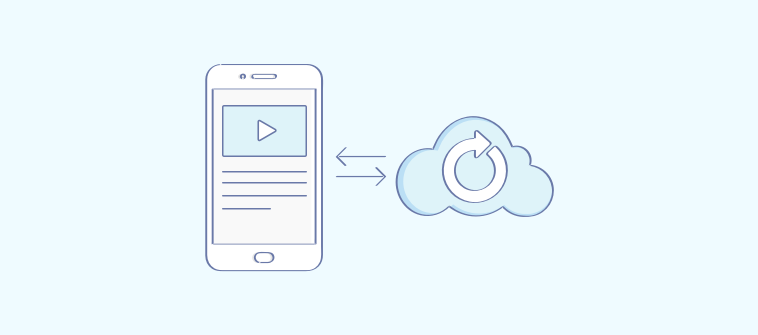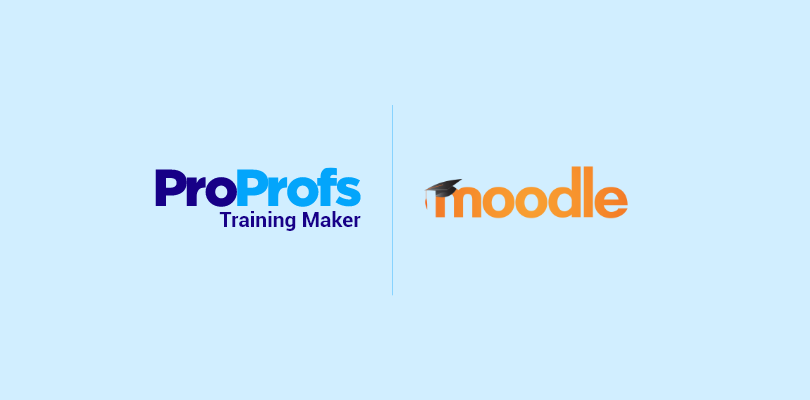Training in healthcare isn’t like any other field; teams need to stay compliant with HIPAA and OSHA, onboard staff quickly, and adapt to constantly shifting regulations.
As one hospital director told me recently, “We don’t just need an LMS, we need a system that understands healthcare.” That insight stuck with me, so I dug deeper, speaking with over 75 healthcare administrators, HR leads, and compliance officers about what’s actually working for them today.
The result? This guide to the 10 best healthcare LMS platforms for 2026. These aren’t generic systems; they’re designed for the unique demands of healthcare, which include robust compliance tools, mobile-friendly interfaces for on-the-go staff, and enterprise-grade security.
So, let’s get started.
What Makes a Healthcare LMS Different From a Regular LMS?
A healthcare LMS is more than just a training tool. It’s built to support the complex, regulated environment of medical organizations. Unlike general platforms, it must align with clinical workflows, adapt to policy changes, and serve multiple departments with varying needs.
It helps you create structured learning paths, centralize records, and stay on track when procedures shift, without relying on paper files or manual follow-ups.
10 Best Healthcare LMS Platforms: In-Depth Reviews
I have compiled this selection of LMS systems for healthcare using my experience, extensive research, and input from colleagues who have used these platforms. Additionally, I have considered unbiased evaluations on external websites and client feedback.
Here’s a quick overview of the top healthcare LMS platforms in 2026, what each is best known for, and where their pricing starts.
| Healthcare LMS | Best for | Pricing |
|---|---|---|
| ProProfs Training Maker | Easy Online Employee Training & Healthcare LMS | Free for small teams; paid plans start at $1.99 per active learner/month |
| Relias Healthcare LMS | Compliance Tracking | Starts at $85/year |
| HealthStream LMS | Certificate Management | Starts at $4/user/month |
| iSpring Learn | eLearning software for PowerPoint | Starts at $2.29/user/month (billed annually) |
| Docebo | Complex Enterprise Training | Starts at $25,000/year |
| Tovuti LMS | Training Large Teams | Starts at $775/month |
| Litmos | External Training | Starts at $3/user/month |
| SkyPrep | Enterprise Learning Needs | Starts at $199/month |
| MedTrainer | Compliance Regulation | Starts at $10/user/month |
| Northpass | Mid-Sized Businesses | Starts at $200/month |
1. ProProfs Training Maker – Best for Easy Online Employee Training & Healthcare LMS
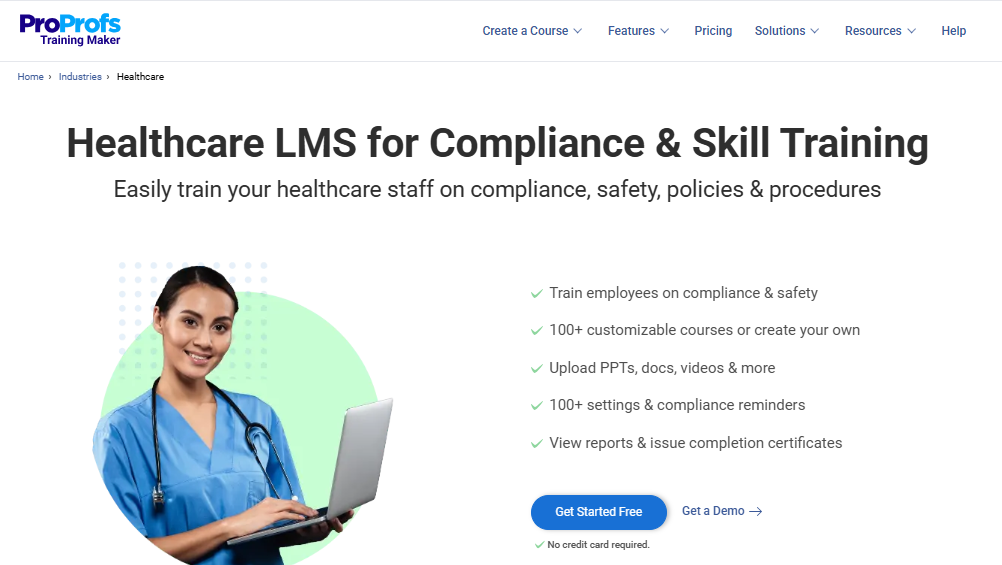
ProProfs Training Maker is built for healthcare teams who need training to work as efficiently as the people delivering it. It does not try to reinvent your workflow. It supports it.
Designed for clinical and non-clinical training alike, the platform helps you roll out updates, manage compliance, and keep every department aligned without losing time or oversight.
As an AI-powered healthcare LMS, ProProfs speeds up course creation by turning your existing materials, policies, SOPs, and onboarding content into structured, trackable training. You get quizzes, lessons, and flow automatically, so your focus stays on accuracy, not admin.
You are not locked into a rigid format. Upload your own PowerPoints, videos, and PDFs, or customize prebuilt healthcare templates to match your exact use case. Infection control, HIPAA, equipment handling, soft skills, whatever needs to be taught, it adapts.
Over 100+ built-in settings let you automate reminders, control expirations, and stay ahead of audits.
The platform supports real-world learning through scenarios, labeled graphics, and assessments that reinforce critical knowledge. These tools are not gimmicks. They help staff retain information that directly affects patient outcomes.
You also get precise, real-time reporting. See who is certified, who is overdue, and where the learning gaps are. Multiple admins can work together without overlap or confusion.
If you are managing training for a healthcare organization, this is the system that gets it right. It does the heavy lifting, adapts to your workflow, and gives you full visibility into what is working and what needs to be fixed.
What You Will Like:
- ProProfs Training Maker provides ready-to-use courses on HIPAA compliance and workplace safety to help healthcare professionals stay compliant.
- The built-in AI speeds up course creation by organizing content, generating quizzes, and suggesting a structure based on your input.
- Users can create personalized training programs by uploading existing materials like PDFs, presentations, and videos.
- You can enable quizzes and assessments to evaluate learners’ comprehension & retention.
- This healthcare LMS supports mobile learning for healthcare staff to access training materials anytime, anywhere, and on any device.
- Real-time tracking of learner progress, course completion rates, and assessment scores for actionable insights.
What You May Not Like:
- No downloadable or on-premise version as it is completely cloud-hosted
- There is no dark viewing mode for the interface yet
User Rating:
G2: 4.6/5
Capterra: 4.8/5
Pricing:
Free for small teams. The paid plans start at $1.99 per active learner/month for large teams. No hidden costs. 15-day money-back guarantee.
2. Relias Healthcare LMS – Best Healthcare LMS for Compliance Tracking
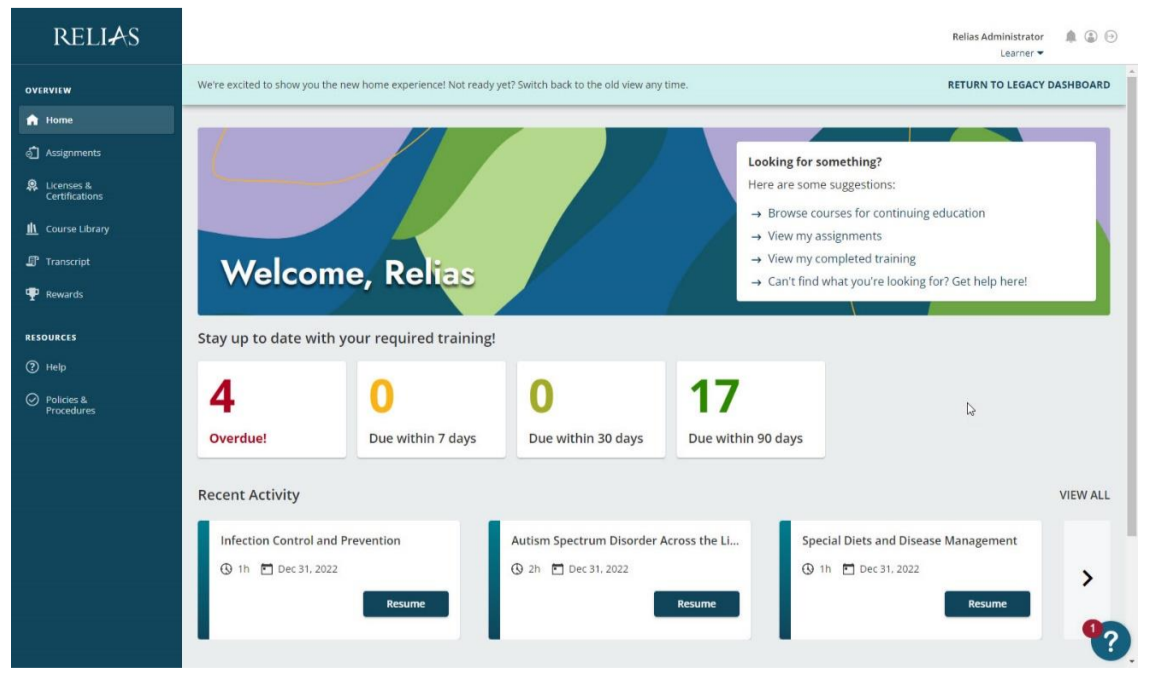
During my experience with Relias Healthcare System, I was impressed by the comprehensive nature of their LMS, which provided a centralized platform for all our healthcare training needs.
Relias simplifies compliance tracking and makes audits less stressful. Automated reports and reminders help keep your staff on track, and its user-friendly interface makes it easy for everyone to navigate and complete their required training.
The award-winning courses and advanced tools are designed to save time and training costs while enhancing the learning experience.
The platform supports easy assigning and enrolling of training specific to staff roles, and organizations can leverage their existing content by turning presentations into functional courses through course authoring. The system supports various eLearning standards, such as SCORM, AICC, and xAPI.
Relias Learning offers over 5,000 courses created by medical experts and national leaders and access to a vast library of custom courses. The platform tracks and maintains requirements for over 135 national accrediting organizations and multiple state regulatory boards.
What You Will Like:
- An extensive course library with over 5,000 healthcare-specific modules ensures your team gets targeted, high-quality training tailored to the healthcare sector.
- Automated compliance tracking helps organizations meet regulatory requirements, reducing the burden on administrators.
- Mobile accessibility allows staff to access training from anywhere, making it easier to maintain compliance during busy schedules.
- Personalized learning paths help match training to individual roles and requirements, optimizing staff development and knowledge retention.
What You May Not Like:
- Limited customization options may not fully align with unique organizational branding or specific workflows.
- Technical glitches in the platform could occasionally disrupt the learning process during critical training sessions.
User Rating:
G2: –
Capterra: –
Pricing:
Starts at $85/year
3. HealthStream LMS – Best Healthcare LMS for Certificate Management
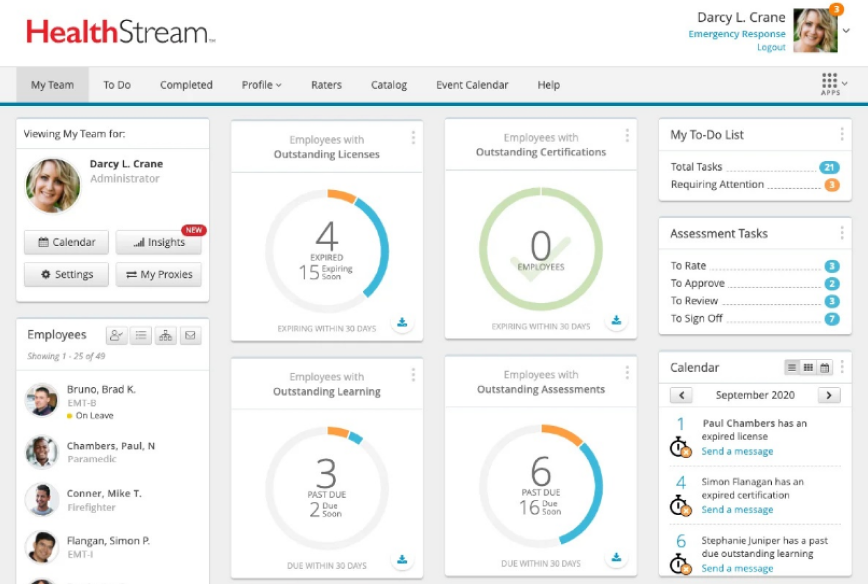
HealthStream LMS is a healthcare training and development tool designed to maximize learning and improve outcomes in the healthcare workforce.
With this LMS, you can easily manage staff certifications and stay ahead of expiration dates. It gives you peace of mind knowing your team is always qualified and compliant, plus you can streamline onboarding with automated workflows for new hires.
As one of the best healthcare LMS systems, this tool provides personalized learning paths for learners, addressing their knowledge gaps and meeting them at their career development stage. It offers features such as automated learning assignments, access to third-party courseware, and configurable reporting.
The system also includes tools for assignment management, annotations, and student groups. HealthStream’s LMS aims to engage and retain top performers, meet compliance requirements, and enhance the quality of patient care through continuous staff development.
What You May Like:
- Competency tracking ensures healthcare staff maintain the necessary skills and certifications for their specific roles, fostering a highly qualified team.
- Integration with HR and healthcare-specific systems, like EHRs, helps streamline operational workflows and centralize training data.
- The mobile-native design provides on-the-go learning opportunities for a workforce that’s always on the move, like nurses and technicians.
- Automated assignment of training modules saves time, ensuring employees get the right learning content without manual effort from administrators.
What You May Not Like:
- The system’s limited collaborative learning tools, like discussion boards, may hinder team-based education efforts.
- Embedding custom e-learning content can be complicated, potentially requiring additional time or technical expertise.
User Rating:
G2: 4.3/5
Capterra: 4.3/5
Pricing:
Starts at $4/user/month
4. iSpring Learn – Best eLearning software for PowerPoint
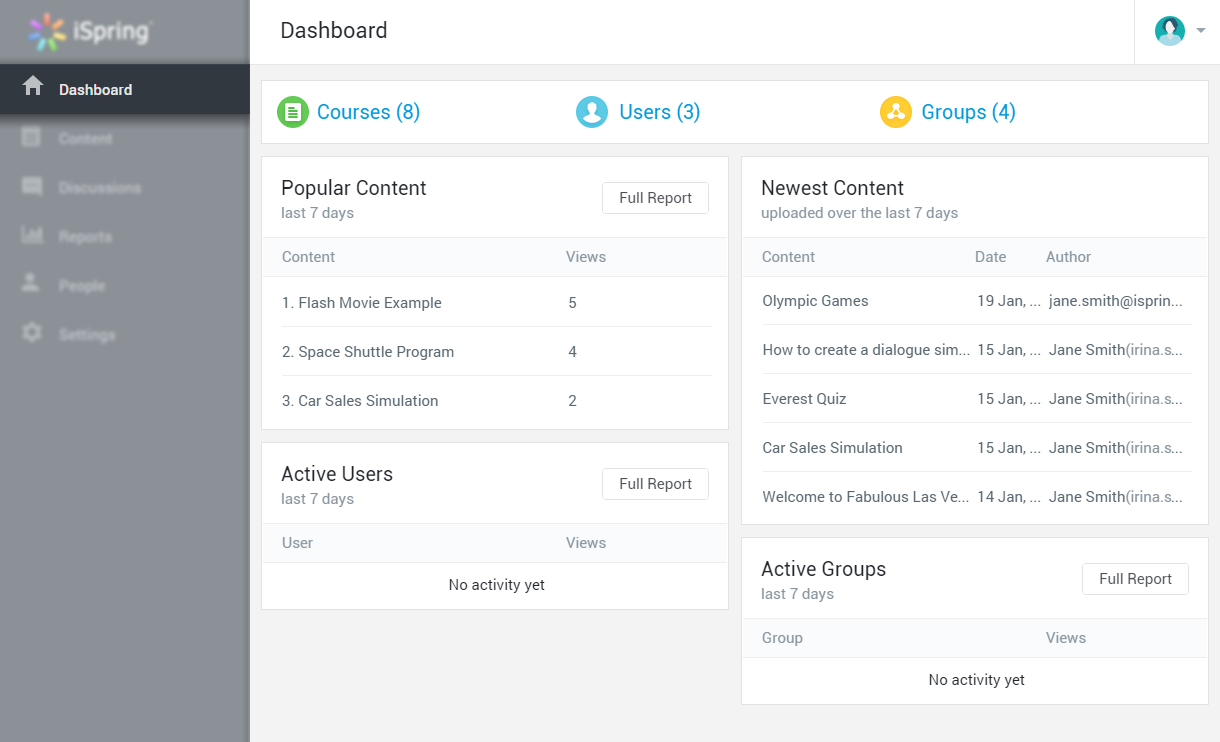
The healthcare LMS by iSpring is a powerful training tool designed specifically for hospitals and healthcare providers. It enables these organizations to deliver high-quality training to their medical personnel and healthcare providers, ensuring compliance with regulations while providing the best possible patient care.
It also helps you transform your PowerPoint presentations into engaging online courses with iSpring Learn. Add quizzes and interactive elements to boost knowledge retention and make training fun, while tracking learner progress with detailed analytics.
Besides, it provides a comprehensive solution for healthcare training. The authoring tool enables the creation of engaging courses, role-plays, and quizzes to keep healthcare personnel up to date and assess their knowledge effectively.
iSpring Learn has been chosen by over 4,000 healthcare organizations worldwide. It has received positive feedback from clients, who have reported improvements in employee readiness, reduced training expenses, and excellent support from the iSpring team.
What You May Like:
- Easily transforms PowerPoint presentations into interactive healthcare training modules, adding quizzes and animations to engage learners effectively.
- Integration with tools like Zoom and Microsoft Teams allows for seamless live training sessions.
- Automated renewal notifications help healthcare facilities stay ahead of certification and compliance deadlines, reducing administrative burden.
- Mobile-friendly access supports busy professionals who need self-paced training available anytime, anywhere.
What You May Not Like:
- Incompatibility with Mac devices can limit accessibility for some users, particularly those in remote settings.
- Video recording features occasionally experience glitches, which could disrupt the creation of training content for healthcare-specific use cases.
User Rating:
G2: 4.6/5
Capterra: 4.7/5
Pricing:
Starts at $2.29/user/month (billed annually).
5. Docebo – Best for Complex Enterprise Training
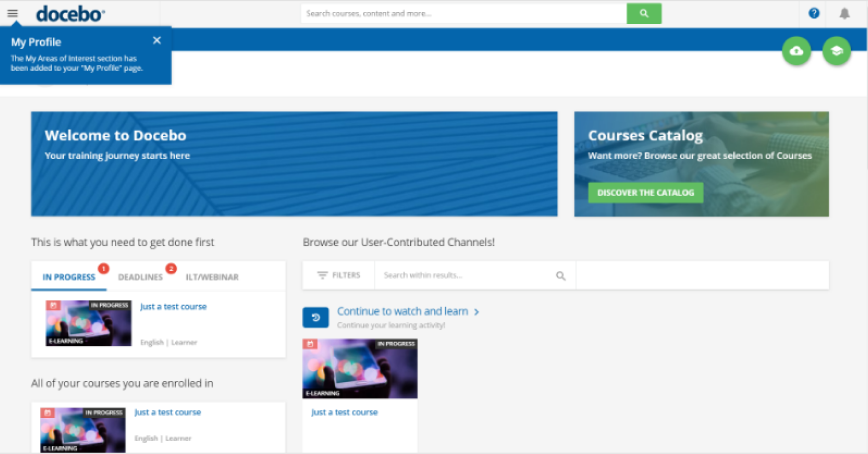
If you make a healthcare learning management system comparison, Docebo might be one of the top options on the list.
For complex healthcare systems with diverse training needs, Docebo offers the flexibility and customization you need. Create personalized learning paths for every role and department, and leverage advanced reporting to measure the impact of your training programs.
In my experience, I have found Docebo’s LMS for healthcare, medical, and telemedicine to be really good. It has been specifically designed to meet the unique training and support needs of healthcare providers, and it has proven to be a valuable tool in our organization. By centralizing training programs and content management, it simplifies compliance management and minimizes risks.
The LMS incorporates blended learning and social learning, making it easier to connect with top healthcare professionals while reducing in-person training costs. It ensures compliance with predefined standards, such as HIPAA, by tracking course completion, automating retraining and certifications, and simplifying reporting.
Healthcare organizations highly regard Docebo’s LMS for offering features like an automated audit trail, mobile learning for medical professionals, robust security measures, and excellent customer support.
Why You Will Like:
- Blended learning capabilities let healthcare organizations combine online and in-person training effectively, saving costs on large-scale onboarding.
- Advanced compliance management tracks certifications, automates renewals, and ensures adherence to regulations like HIPAA.
- Customizable learning paths help tailor training to meet the unique needs of healthcare roles, from nurses to administrators.
- Robust reporting tools provide actionable insights into staff progress, helping organizations pinpoint areas needing improvement in training programs.
What You May Not Like:
- The learning curve for new administrators can be steep, particularly in settings with large, diverse teams.
- Limited archiving options for past content and user data can create challenges in organizing older materials or maintaining historical records.
User Rating:
G2: 4.3/5
Capterra: 4.4/5
Pricing:
Starts at $25000/year
6. Tovuti LMS – Best Healthcare LMS for Training Large Teams
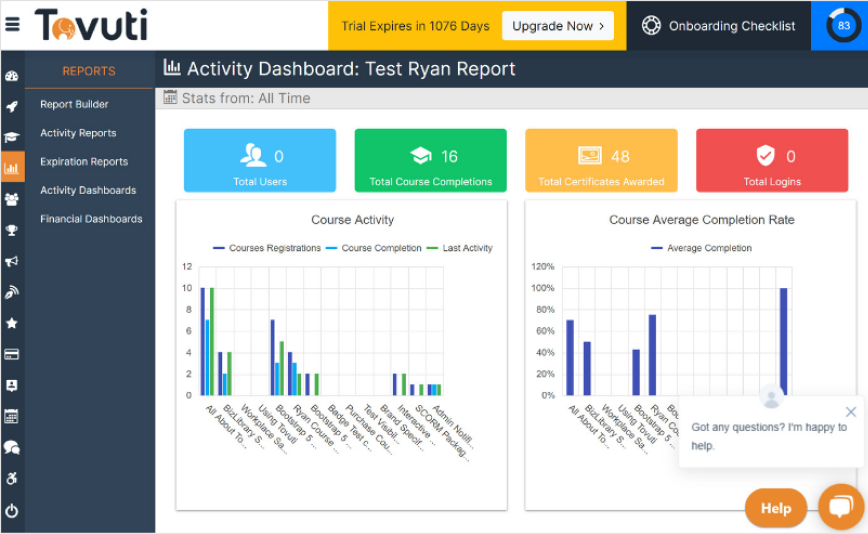
Tovuti LMS is a robust healthcare LMS software catering to multiple industries, including healthcare organizations. It centralizes training programs into one easy-to-use platform, making training manageable, trackable, and transparent.
You can even onboard large teams effectively with this tool. Its scalable platform and user-friendly interface ensure consistent training delivery across your entire organization, and its built-in communication tools facilitate collaboration and knowledge sharing.
Tovuti supports fast implementation, and it integrates with over 2,000 APIs, allowing you to connect to various platforms seamlessly. The fully customizable platform allows you to extend your brand experience and create tailored learning paths for individual learners.
With access to over 30,000 pre-built courses, a mobile app for on-the-go learning, and interactive features like gamification, Tovuti engages learners and increases knowledge retention. It also provides automated features for enrollments, reminders, and certifications.
What You Will Like:
- Granular reporting capabilities allow healthcare administrators to track individual progress and pinpoint training gaps, aiding compliance efforts.
- Interactive learning features, like quizzes and gamification, increase engagement and knowledge retention among busy staff.
- Virtual classroom support facilitates real-time training, which is critical for healthcare settings requiring rapid skill acquisition.
- Built-in communication tools encourage collaboration and information sharing among large teams across departments or locations.
What You May Not Like:
- The steep learning curve for some features can make onboarding new administrators time-consuming.
- Limited language support restricts accessibility for multilingual teams, which can be an issue in diverse healthcare environments.
User Rating:
G2: 4.6/5
Capterra: 4.8/5
Pricing:
Starts at $775/month
7. Litmos – Best for External Training
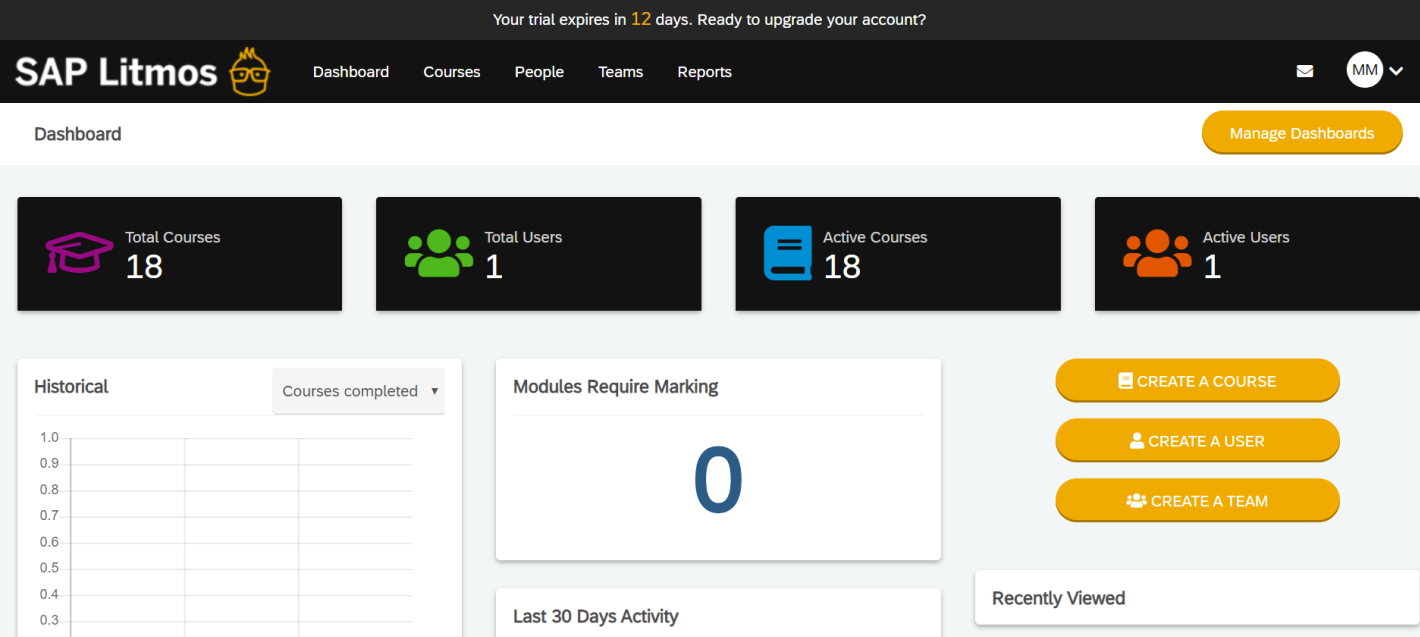
Training is crucial in healthcare, as every task performed by staff members affects patients directly or indirectly. In this regard, Litmos can be helpful. It is a comprehensive LMS that provides healthcare companies with the necessary tools to improve the patient experience and streamline the revenue cycle.
Litmos offers online learning solutions that help healthcare organizations train their staff on best practices, compliance requirements (such as HIPAA and OSHA), and core skills. What I found particularly impressive is that the tool allows the creation of courses and content that adhere to regulatory standards. It has a catalog of healthcare-focused courses covering topics such as policy and compliance, health and safety, and well-being.
Another interesting aspect is its ease of use to train external partners. Litmos’s intuitive design and mobile accessibility make it convenient for everyone to access training materials, and its e-commerce integration allows you to monetize your courses.
Security is a top priority for Litmos, with robust measures in place to protect content and user information. The system features role-based training controls, allowing administrators to assign and track ongoing continuing education for different organizational roles. The platform offers a 14-day free trial, allowing organizations to test its features and experience the benefits of online learning management.
What You May Like:
- Pre-built, healthcare-focused courses on topics like compliance and patient safety accelerate the training setup process for organizations.
- Intuitive mobile access ensures healthcare workers can complete courses during downtime, minimizing schedule disruptions.
- Automated compliance tracking and notifications keep organizations on top of regulatory requirements like OSHA and HIPAA.
- Role-based training capabilities allow administrators to assign specific courses to staff based on job functions, optimizing learning outcomes.
What You May Not Like:
- Limited integration options can make it challenging to sync with existing healthcare management tools or systems.
- Reporting tools may lack the granularity needed for in-depth analysis of learner performance, particularly for regulatory audits.
User Rating:
G2: 4.3/5
Capterra: 4.2/5
Pricing:
Starts at $3 per user/month
8. SkyPrep – Best Healthcare LMS for Enterprise Learning Needs
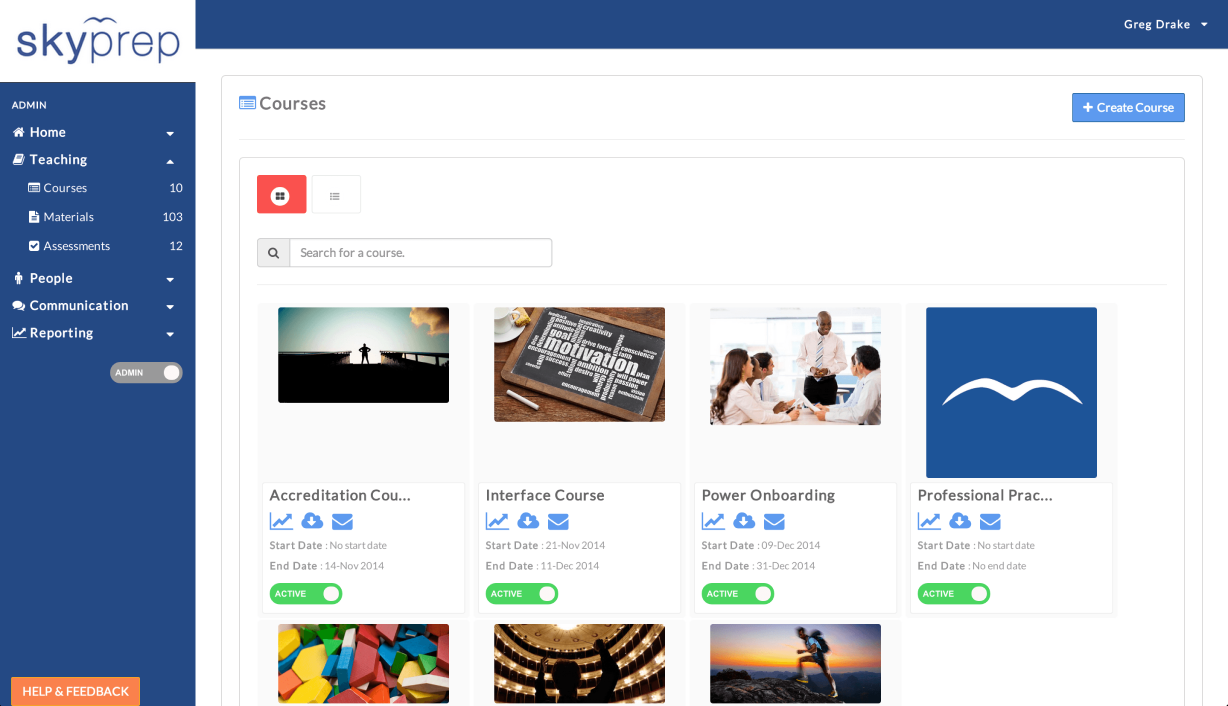
SkyPrep is a learning management system designed to meet the unique training needs of healthcare organizations. SkyPrep offers comprehensive solutions to improve the patient experience and streamline the revenue cycle in the fast-paced healthcare industry, where continuous training and certification are essential.
With SkyPrep’s LMS, healthcare organizations can offer certification training, ensuring employees receive recognized credentials upon course completion. The platform also enables HIPAA and policy compliance training, providing robust reporting capabilities to meet regulatory requirements. Additionally, SkyPrep facilitates continuing education, motivating employees to further their knowledge and skills through interactive learning.
One aspect of SkyPrep that truly impressed me was its focus on continuing education. The platform actively encourages employees to expand their knowledge and skills through interactive learning experiences. The tool offers a seamless and easy-to-use platform accessible anytime, anywhere.
In fact, as your healthcare organization grows, SkyPrep scales with you. Robust reporting and analytics help you track progress and identify areas for improvement in your training programs, while its automation features save you time and streamline administrative tasks.
What You Will Like:
- Certification tracking ensures that healthcare staff meet all compliance and licensure requirements, reducing risks for the organization.
- Gamification features, like badges and leaderboards, keep learners motivated in high-stress, fast-paced environments.
- Robust analytics provide clear insights into staff progress, helping organizations improve their training programs effectively.
- User-friendly mobile access enables employees to learn and complete certifications on the go, which is ideal for medical professionals with tight schedules.
What You May Not Like:
- Managing user groups and roles can be challenging in larger organizations with diverse teams.
- Reporting features may lack the depth required to fully meet compliance or performance tracking needs.
User Rating:
G2: 4.6/5
Capterra: 4.8/5
Pricing:
Starts at $199/month
9. MedTrainer – Best Healthcare LMS for Compliance Regulation
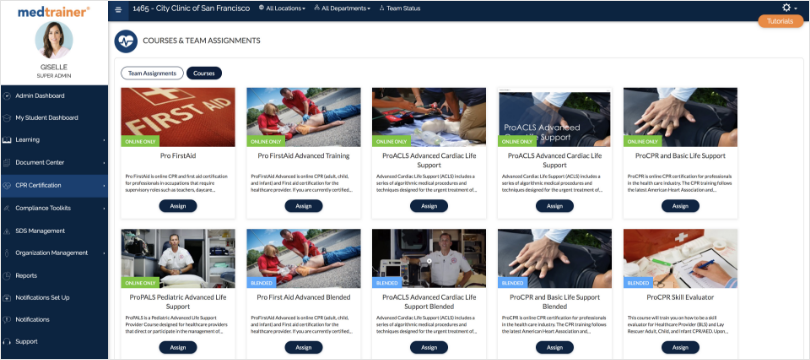
MedTrainer is trusted by over 3,000 clients, serving more than 15,000 healthcare facilities and benefiting over 300,000 healthcare professionals. The platform helps you stay ahead of compliance regulations with up-to-date training materials and ensures your organization meets the latest requirements.
This software enables organizations to meet the standards of multiple regulatory bodies, including HIPAA, OSHA, HRSA, TJC, QUAD A, CMS, OIG, CLIA, and CARF. One of the key components of MedTrainer is the learning module. It provides access to nearly 1,000 healthcare-specific courses covering a wide range of topics relevant to healthcare professionals, enabling them to stay updated with the latest industry knowledge and regulatory requirements.
With over 300 continuing education unit (CEU) courses and premium courses like CPR/BLS, the tool provides real-time reporting capabilities to monitor training progress and ensure compliance.
What You Will Like:
- A comprehensive healthcare-specific course library supports compliance with standards from organizations like OSHA, HIPAA, and TJC.
- Automated credentialing and compliance tracking reduce administrative work, keeping your organization aligned with industry regulations.
- Real-time reporting capabilities give administrators immediate insights into staff progress and areas needing improvement.
- An accessible, user-friendly interface ensures that healthcare professionals and administrators can easily navigate the platform.
What You May Not Like:
- Limited integration options with third-party systems may cause workflow disruptions for organizations reliant on broader healthcare tools.
- The notification system could use improvements to ensure timely updates for learners and administrators.
User Rating:
G2: 4.4/5
Capterra: 4.3/5
Pricing:
Starts at $10/user/month
10. Northpass – Best Healthcare LMS for Mid-Sized Businesses
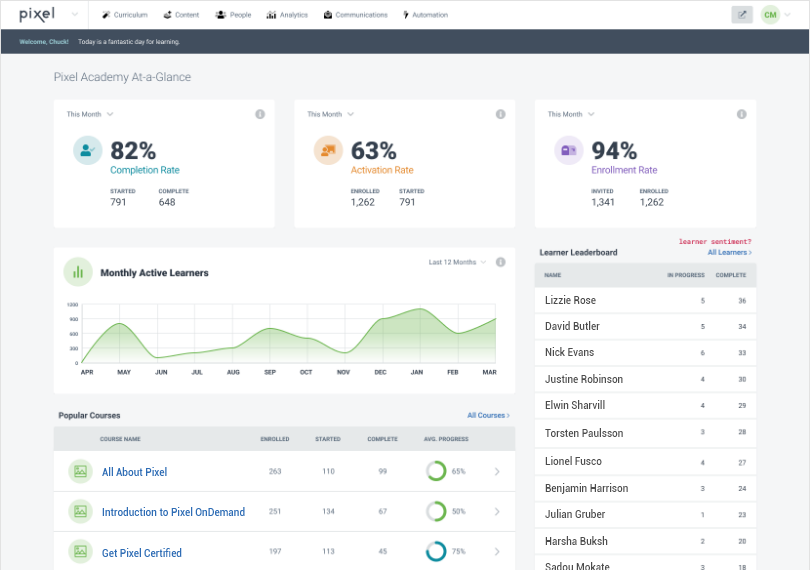
Northpass is a powerful LMS for customer education. It provides a comprehensive solution for delivering on-demand learning experiences. With Northpass, businesses can enhance productivity, reduce costs, and elevate customer experiences through digital learning solutions.
It offers a balance of features and affordability, especially for mid-sized healthcare businesses. You can easily customize the platform to fit your specific training needs and enjoy excellent support. Plus, it integrates with existing HR and payroll systems for seamless operations.
Businesses can enhance learner engagement, proficiency, and product usage by offering quality, personalized content available on demand. Learners can access the learning materials at their own pace, encouraging ongoing interaction with the brand and fostering a deeper connection with the product or service.
The best thing I found about this platform is that it provides valuable learning insights and analytics, allowing businesses to measure the impact of their learning efforts. By tracking learner progress and engagement, organizations can gain actionable data and insights into the effectiveness of their training programs. This information helps optimize and refine the learning experience to ensure continuous improvement.
What You Will Like:
- Tailored course creation tools allow healthcare businesses to design training programs specific to their organizational needs and goals.
- Detailed analytics help track learner engagement, enabling organizations to refine their training strategies and improve effectiveness.
- Integration with existing HR and payroll systems simplifies operations, ensuring seamless learner onboarding and tracking.
- Mobile-friendly design allows staff to access training materials at their convenience, fostering continuous education.
What You May Not Like:
- Limited customization options may restrict branding and program personalization for mid-sized healthcare organizations.
- Fewer integrations compared to competitors may require workarounds to connect with other systems.
User Rating:
G2: –
Capterra: 4.8/5
Pricing:
Starts at $200/month
Evaluation Criteria
My approach to evaluating each healthcare LMS in this post is aimed at offering an honest, unbiased perspective. I’ve relied on these six factors:
- User Feedback & Ratings: I used real user feedback sourced from credible platforms, such as G2 and Capterra, which reveal firsthand experiences that are invaluable for assessing overall satisfaction and spotting potential issues users face.
- Core Features & Functionality: The true worth of each product is measured through its essential features and functionalities. I looked closely at what each tool offers, providing insights on how well it delivers on practical needs.
- Usability: A product’s ease of use is essential, from design to navigation. By analyzing the user experience, I ensured that each tool was accessible to individuals of all expertise levels.
- Customer Support Quality: Effective customer support is non-negotiable. I evaluated responsiveness, problem-solving efficiency, and the availability of guidance for setup and troubleshooting.
- Value for Money: Determining value goes beyond price—it’s about understanding the balance of cost, quality, and performance. I aim to help readers recognize where they can get the best return on investment.
- Personal Insights & Expert Opinions: Leveraging my own experience along with insights from industry experts, I provided an informed, nuanced view that’s both personal and expert-backed, ensuring you get the most reliable recommendations.
How to Choose the Right LMS for Healthcare
Choosing the right LMS for healthcare isn’t about ticking boxes. It’s about finding a platform that fits the way your team actually works, whether you’re managing compliance training across hospitals or building onboarding for a small clinic. Let’s dive into how to choose the right one!
Short on time? Here’s a quick video that you can watch –
Check out the detailed version of the video below:
1. Built-In Compliance Support
Your LMS should make it easier to meet HIPAA, OSHA, and Joint Commission requirements, not harder. Look for automated reminders for certification renewals, audit-ready reports, and role-based training paths that align with clinical guidelines. If it doesn’t help you stay compliant on autopilot, it’s not the right fit.
2. Ready-to-Use Healthcare Content
Healthcare teams don’t always have time to build courses from scratch. Platforms that offer preloaded content on infection control, patient safety, HIPAA, or workplace hygiene save hours, especially if the content is regularly updated.
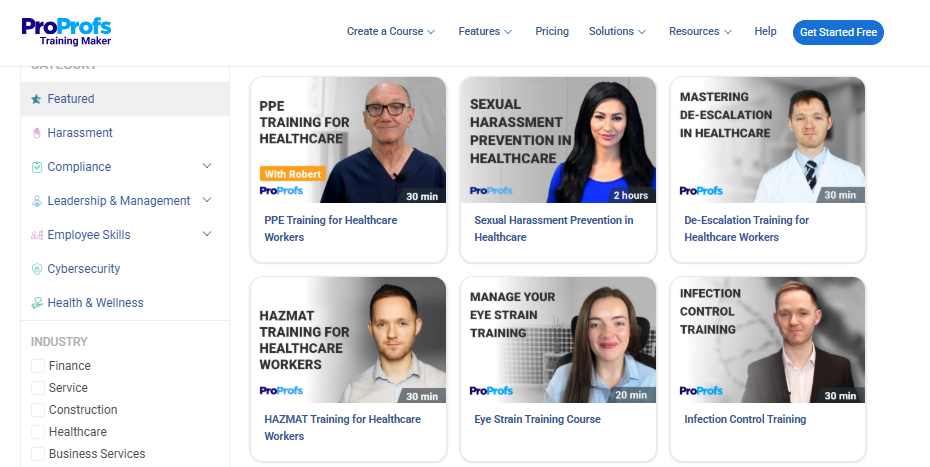
3. AI That Speeds Up Real Work
AI in a healthcare LMS isn’t a nice-to-have. It takes your existing materials, policy documents, clinical protocols, and onboarding guides and turns them into structured training. It builds course layouts, generates quizzes, and standardizes content across roles.
Watch how you can create a course in minutes with ProProfs AI for healthcare.
4. Flexible Course Creation Tools
If you need to train staff on internal policies, EMR workflows, or facility-specific protocols, your LMS should let you upload your own material in multiple formats, including PDFs, videos, SCORM packages, and even PowerPoint. Bonus points for drag-and-drop editors and built-in quizzes.
5. Mobile-First Experience
Training often happens between shifts or on the go. That’s why mobile compatibility isn’t optional; it’s essential. Look for platforms that work well on phones and tablets, load fast, and allow course completion without logging into a desktop.
6. Accurate Tracking and Progress Reports
To stay audit-ready, you need full visibility into training completion, quiz scores, overdue certifications, and learner activity. Strong reporting tools help you catch gaps early and prepare for compliance checks without stress.
7. Integration With Your Existing Systems
If you’re using an HR tool, credentialing system, or scheduling platform, make sure the LMS can plug into it. Support for APIs, Single Sign-On (SSO), and automatic data sync saves time and reduces double-work for admins.
8. Strong Data Security
Training platforms often handle sensitive information, including staff records, medical policies, and login data. HIPAA-compliant security, role-based access, encryption, and regular system updates are must-haves, not extras.
Watch how HIPAA training supports data security in healthcare.
9. Certification and Assessment Tools
Built-in quizzes, exams, and auto-issued certificates help you measure knowledge retention and prove compliance. Look for platforms that let you customize assessments by department or job role.
10. Scalability and User Management
Whether you’re training 50 staff members or 5,000, your LMS should grow with you. This means smart user grouping, role-based access, and centralized admin dashboards that simplify large-scale management.
Get Free LMS Software — All Features, Forever.
We've helped 567 companies train 200,000+ employees. Create courses in under a minute with our AI LMS or use 200+ ready-made courses on compliance, harassment, DEI, onboarding, and more!
Role-Based Training in Healthcare: What to Look For
Training in healthcare should reflect the actual work people do. A nurse doesn’t need the same learning path as someone in billing or housekeeping. That’s why a good LMS for healthcare must support role-based training. It should let you assign the right courses to the right people, track their progress, and avoid confusion across departments.
Here’s what that means for different roles:
For Nurses
Nurses need training in infection control, patient safety, clinical procedures, emergency response, and communication. Many also need continuing education credits to maintain their licenses. Your LMS should support recurring training cycles, quiz-based assessments, and easy certificate tracking. If nurses move across units, the system should let you assign additional content based on their current duties.
For Doctors and Medical Staff
Doctors often need training on new equipment, clinical protocols, hospital policies, and proper documentation. If they work across multiple locations, they should be able to see all assigned modules and track what they’ve completed in one place. Some healthcare organizations also upload CME (continuing medical education) material into their LMS so doctors can meet ongoing learning requirements without leaving the platform.
For Administrative and Billing Teams
These roles require focused training on HIPAA, data security, insurance workflows, and policy updates. Look for an LMS that allows you to build short, practical courses with automatic due dates and certification reminders. Role-based access also helps keep sensitive data separate from general training.
For Dietary, Housekeeping, and Support Staff
Training for these teams often covers food safety, hygiene, infection prevention, and emergency protocols. Since many of these workers are part-time or shift-based, the LMS should be easy to access, mobile-friendly, and simple to navigate. Translation support or visual content may also be useful for teams with diverse language backgrounds.
A strong LMS gives every employee what they need to stay safe, skilled, and compliant. If it forces everyone through the same generic training, it’s not built for healthcare.
How a LMS for Healthcare Training Supports Compliance
In healthcare, compliance isn’t a checkbox. It’s a constant, high-stakes responsibility. One missed certification, one expired policy, or one untrained staff member can lead to fines, failed audits, or worse, compromised patient safety. That’s why the right LMS isn’t just helpful, it’s critical.
Here’s how a good healthcare LMS supports compliance in practical, everyday ways:
1. Keeps Training Up to Date
Rules don’t stay the same. HIPAA updates, OSHA changes, or new Joint Commission standards can roll out at any time. A healthcare LMS lets you update content quickly and push out new training without delay. This means no lag between policy changes and staff awareness.
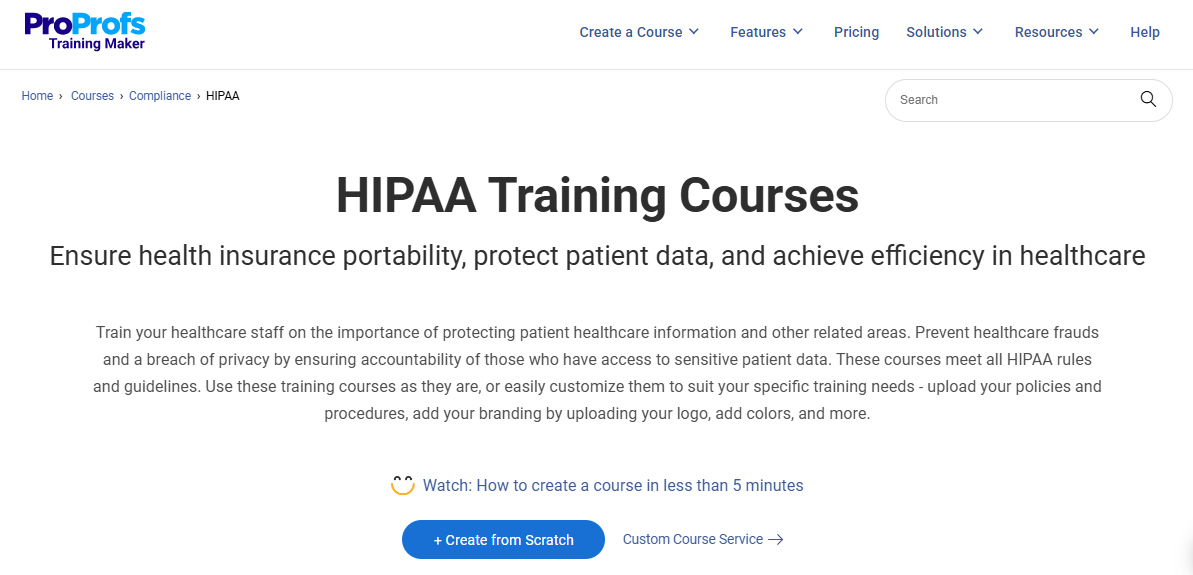
2. Automates training schedules and renewals
Manually tracking who needs to renew certifications is risky and time-consuming. A smart LMS sends automated reminders to staff, alerts managers about expiring credentials, and locks overdue users out of critical systems if needed. This helps prevent non-compliance before it happens.
3. Documents Everything for Audits
If you’ve ever gone through an audit, you know documentation matters as much as the training itself. A healthcare LMS software keeps time-stamped records of course completions, quiz scores, and certificate issue dates. You can pull reports anytime to show compliance by department, individual, or topic, and no scrambling is needed.
4. Supports Different Compliance Paths for Different Roles
Not everyone needs the same compliance training. Nurses may need annual infection control and medication safety modules. Billing teams need HIPAA and fraud prevention. Housekeeping needs training on chemical safety and sanitation. A good LMS lets you assign the right compliance content to the right roles and track each group separately.
5. Protects Sensitive Data Throughout the Process
Compliance isn’t just about training content. It’s also about how your LMS handles staff data. Tools built for healthcare should support encryption, secure logins, audit trails, and full HIPAA alignment. This helps protect your organization from risk on both the learning and data fronts.
Key Integrations That a Healthcare LMS Should Offer
Choosing the right LMS isn’t just about what it can do on its own. In healthcare, integration matters. Your training platform needs to work seamlessly with HR systems, credentialing workflows, and clinical operations. If it doesn’t connect well, it slows everything down.
Here are the most important integrations to look for when evaluating a healthcare LMS:
1. HRIS Integration (for Managing Users and Roles Automatically)
If your HR system already tracks employee roles, departments, and start dates, your LMS should be able to pull that data in automatically. This avoids manual data entry and ensures that new hires get the right training on day one. It also helps when people move departments, go on leave, or leave the organization; the LMS stays in sync without constant admin work.
2. Single Sign-On (SSO) for Easy and Secure Access
In large healthcare systems, logging into yet another tool with a separate password adds friction and risk. SSO lets users log in with the same credentials they already use for other systems. This improves adoption, cuts down password reset requests, and keeps data access controlled through your existing IT security.
3. Credentialing System Integration (to Manage Professional Requirements)
Many healthcare roles come with licensing or credentialing requirements, whether it’s a CPR certification, a state license, or infection control renewals. Integrating your LMS with a credentialing platform helps you track these items in one place. It also ensures that training and compliance data feed into your organization’s official credentialing records, without duplication.
4. Electronic Health Record (EHR) Integration (for Advanced Use Cases)
For enterprise-level hospitals and clinical networks, EHR integration is a high-value bonus. It lets you tie training completion to system access or job eligibility. For example, if a nurse hasn’t completed a module on a new medication system, they can be restricted from using it inside the EHR until the training is done. This kind of workflow helps prevent errors and enforce real-time accountability.
5. Reporting and BI Tool Compatibility (to Support Data-Driven Decisions)
Some healthcare teams use tools like Power BI or Tableau to monitor staffing, operations, or compliance. Your LMS should be able to export clean data or connect through APIs so you can build custom dashboards that show training gaps, department-level trends, or risk areas.
Streamline Employee Training With Healthcare LMS
A healthcare LMS can simplify and enhance the training process for medical professionals by providing accessible, organized, and compliance-driven learning solutions.
From onboarding to ongoing certifications, an LMS ensures that healthcare teams stay informed, qualified, and ready to deliver exceptional care. Investing in an LMS with customizable courses and reporting tools helps healthcare institutions achieve training objectives efficiently and consistently.
You can choose a quality LMS like ProProfs Training Maker, which supports features such as readymade course, assessment tools, and progress tracking to streamline healthcare training.
Frequently Asked Questions
What systems should my healthcare LMS integrate with first?
Instead of trying to integrate everything at once, start with your HR system. This makes user setup and role-based course assignment much easier. From there, add credentialing platforms to track licenses and renewals. Larger teams can explore EHR integration if training access needs to connect with system access.
Can small healthcare teams use an LMS without needing a large budget?
ProProfs gives small healthcare teams exactly what they need: preloaded courses, drag-and-drop creation, and real-time tracking. You can launch training in a day without needing developers, IT support, or a long setup process.
What features should I avoid when picking a healthcare LMS?
Avoid platforms that make you upload and manage everything manually, or those that can’t support different training paths for different roles. Also, be cautious of tools that lack audit trails, don’t offer reminder automation, or aren’t mobile-friendly; these will slow you down or leave critical gaps.


 We'd love your feedback!
We'd love your feedback! Thanks for your feedback!
Thanks for your feedback!




